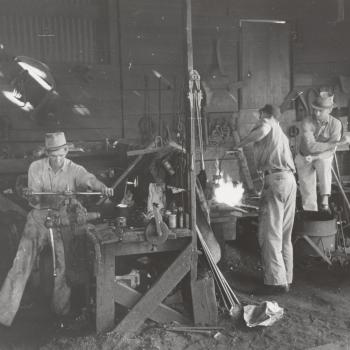Subsidiarity is a Catholic social principle that celebrates the multiplicity of small institutions that buffer a person from the mega-forces of big business and big government; institutions like the family, the parish, an ethnic club or the precinct. Brian Dijkema, writing in National Affairs (Winter/18), correctly and refreshingly includes labor unions among those mediating institutions that help families navigate in our wider society and global economy. I say “refreshingly” because in recent times several social policy thinkers who acknowledge the crucial role of civil society are cool toward unions. They are pro-family, pro-church and pro-soccer league, but they don’t want the countervailing efforts of unions.
Dijkema, who is with Cardus (www.cardus.ca), a Christian think tank in Hamilton, is aware that the “social institutions that define a rich human life” are in decline, leaving us with a more-or-less random collection of “atomized individuals.” Dijkema thus offers general suggestions for the renewal of local institutions, which in this essay he applies to unions.
Organized labor should embrace the Catholic principle of subsidiarity and its companion, the principle of solidarity. Dijkema does not mean that union leaders should be Catholics. He means that Catholic tradition (and other religious traditions) has resources that can help unions attract and retain a younger generation. Dijkema seems to assume that today’s churches are carriers of these social resources—an assumption those of us involved with parish life question at times. In any case, he is correct that unions and churches can be mutually beneficial. If that is, they approach each other with clarity; not merely in a utilitarian way to get more people at a union rally or to sell more tables at a church banquet.
Dijkema details a contrast between the dominant approach of unions today and an approach that uses solidarity and subsidiarity. In the dominant approach, unions pour money into electoral campaigns. Instead they need to use money and energy “to recapture the imagination of local communities.” In the dominant approach union leaders think power comes through elected officials whereas power can emerge from deliberate encounters between and among grass-roots leaders. Unions, Dijkema says, turn too eagerly to government entities to set wages (a national minimum wage or a local living wage) instead of fighting for a union’s proper function of collective bargaining. Many of today’s unions, Dijkema charges, want “a big play” in the arena of government and/or corporate partnership, a win that will give the union new life. But short cuts don’t last. Unions, like churches, cannot grow “without the requisite work of building the many small, social relationships that act as the strongest binding agents for voluntary associations.” That requisite work means hundreds of one-to-one conversations among a mix of like-minded people, precisely the dynamic of subsidiarity and solidarity.
Dijkema makes some worthwhile suggestions. For example, he thinks unions would benefit from articulating a philosophy or theology of work. Such a project would also, I would add, benefit churches as they seek to attract and retain young families.
However, Dijkema’s either-or tone detracts from his message. Why should a union choose between a national campaign on wages and proposals to “address the challenges faced by young families”? Why, as Dijkema implies, is every campaign that involves government a distraction? If unions and other fair-minded groups do not oppose the misnamed right to work laws, for example, there will only be fewer intermediate groups and more atomized individuals. What if unions did not participate in Fight for $15 campaigns? What mechanism would there then be for teaching young adults about immigration, labor history and more?
Dijkema concludes with a quotation from Pope Benedict XVI (aka Joseph Ratzinger) on a pure remnant church. Dijkema then proposes “a smaller, simpler and less socially prominent labor movement.” Whatever Benedict XVI’s context, sectarian Catholicism is a contradiction in terms. Advocating for a small church is Catholic heresy. A baptized Catholic, for example, cannot casually become non-Catholic. The doors are wide open. Given the state of unions in the U.S., it is hard to understand how a smaller labor movement would in any way make for a richer society.
Droel edits INITIATIVES (PO Box 291102, Chicago, IL 60629), a newsletter on faith and work.










